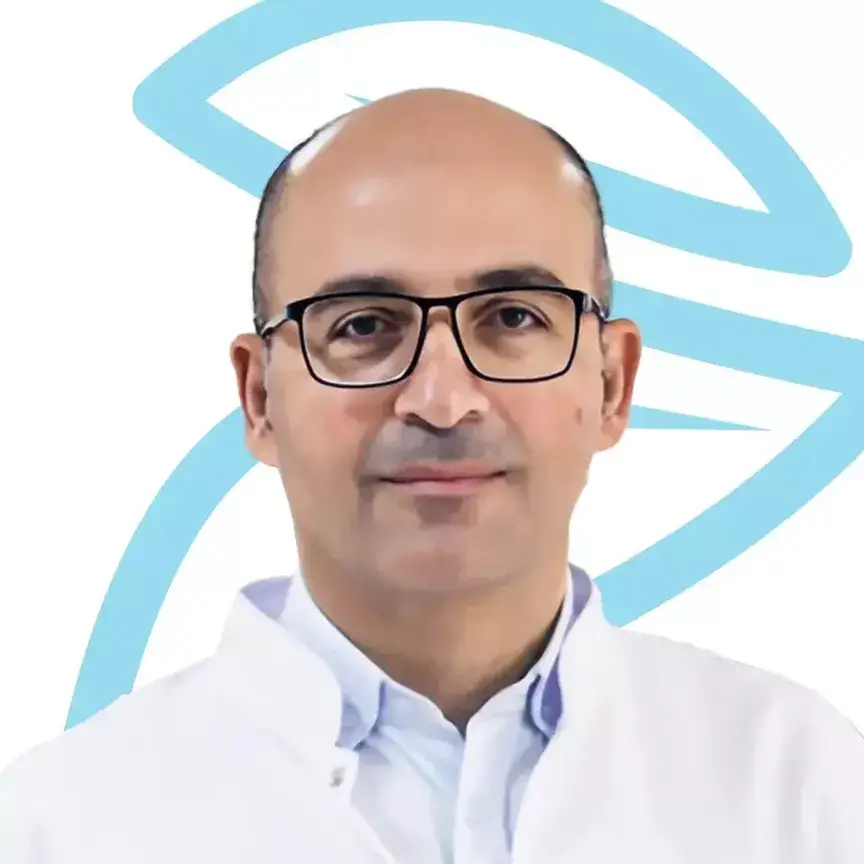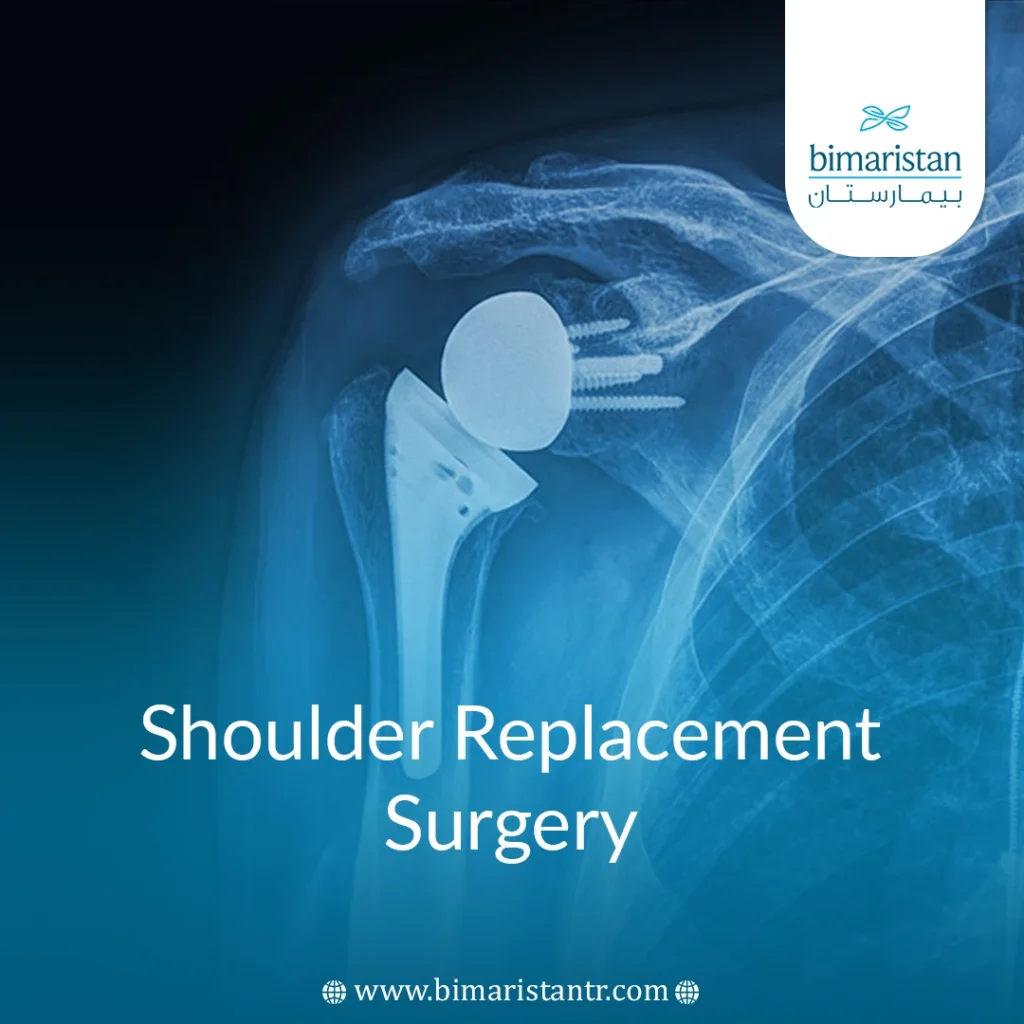Shoulder replacement surgery in Turkey is regarded as a leading procedure. Replacing the shoulder joint offers a permanent solution to many shoulder issues. Turkey has advanced expertise in orthopedics, particularly in shoulder surgeries.
The shoulder is an essential joint with a more excellent range of motion than any other joint. If it causes you pain to the extent that you cannot reach the cabinet or have trouble sleeping, your doctor may recommend a shoulder replacement operation with an artificial joint. This procedure can help alleviate pain and increase your ability to move.
Total shoulder replacement surgeries are frequently performed in Turkey today, with excellent results in both knee and shoulder replacements. Although shoulder joint replacement is less common than hip or knee replacements, it is crucial for patients with persistent shoulder conditions that do not respond to other treatments.
What is shoulder replacement surgery?
Shoulder replacement surgery is a procedure that helps eliminate pain and functional impairment by replacing the damaged parts of the shoulder joint with artificial components called prosthetic joints.
The most common reasons for shoulder replacement surgery are osteoporosis, rotator cuff damage, vasculitis, or rheumatoid arthritis.
Shoulder arthroplasty surgery aims to relieve pain, improve joint strength, increase range of motion, and enable the patient to use their shoulder and arm.
How does the shoulder joint work?
Like the hip joint, the shoulder is a large ball-and-socket joint that allows for a more excellent range of motion than any other joint.
The shoulder joint comprises bones, tendons, muscles, and ligaments that help stabilize and facilitate movement. It includes the scapula (shoulder blade), the clavicle (collarbone), and the humerus (upper arm bone).
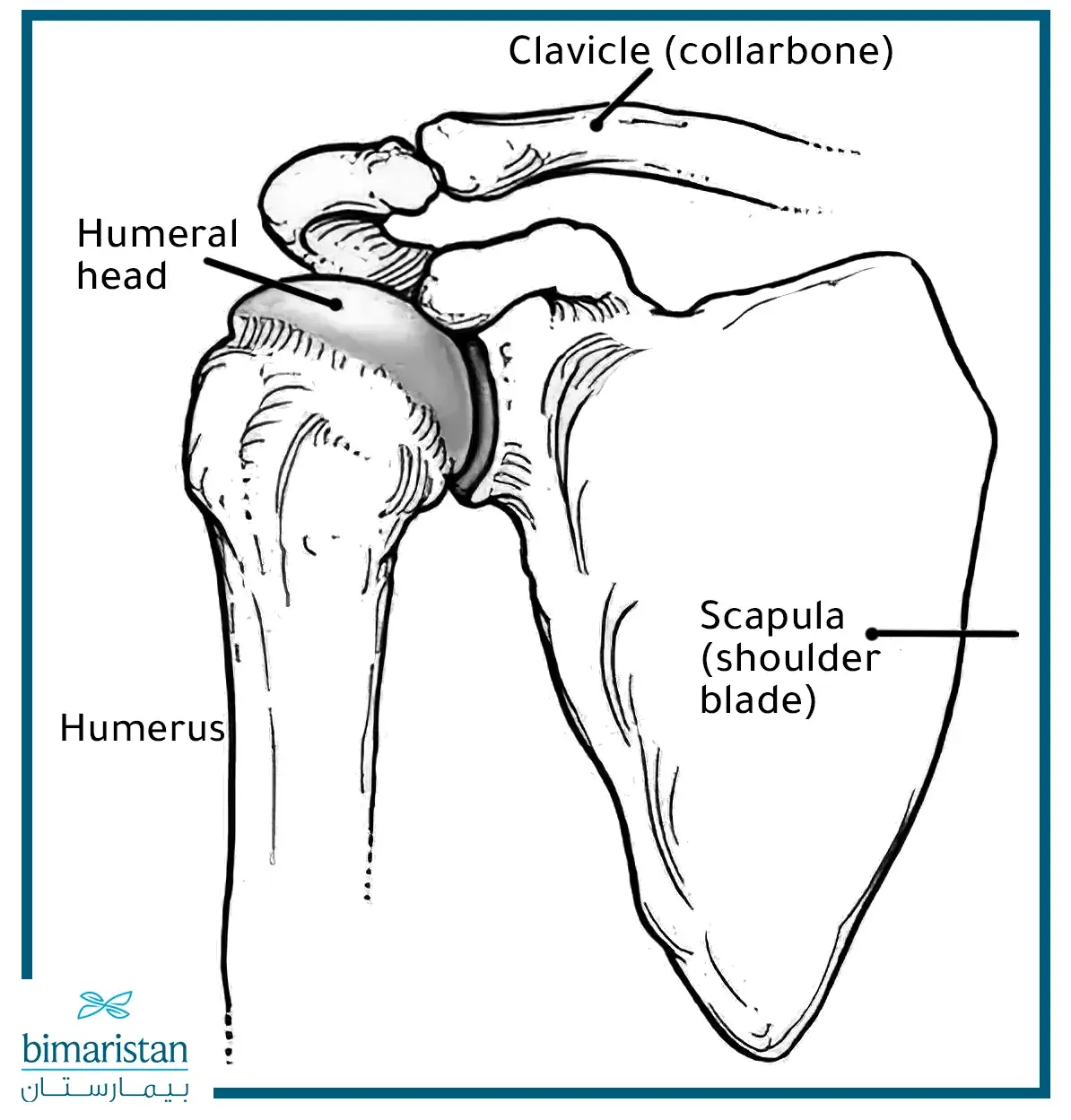
The scapula connects to the shoulder blade at the glenoid socket, which connects the shoulder to the rib cage and allows movement away from the body. The rounded head of the humerus, or upper arm bone, rests in the socket of the shoulder blade.
The bone surfaces that come into contact are covered with a soft tissue called cartilage, which protects the bones and enables smooth sliding and movement. The muscles and tendons surrounding the shoulder provide stability and support.
A thin and soft tissue called the synovial membrane covers all remaining surfaces within the shoulder joint. In a healthy shoulder, this membrane produces a small amount of fluid that lubricates the cartilage and eliminates almost any friction in the shoulder.
The rotator cuff muscles are a group of four muscles that surround the shoulder joint. Their tendons attach to the end of the upper arm bone. The rotator cuff’s function is to maintain the stability of the shoulder joint and assist in its movement.
For this reason, when the tendons of the rotator cuff tear, patients experience pain, instability, and loss of function. Trauma from a fall in an elderly patient or sports injuries can lead to a rotator cuff tear.
Depending on the size and location of the tear, the patient’s age, the persistence of symptoms, the overall health of the patient, the range of motion, and the required level of activity, rotator cuff tears can be treated with physical therapy or subacromial corticosteroid injections. When these measures fail, the doctor may suggest the placement of an artificial shoulder joint.
How are artificial joints made?
A metal ball made of a particular type of stainless steel replaces the humeral head. The ball is connected to a stem usually made of titanium, keeping it attached to the arm. In contrast, a polyethylene cup replaces the glenoid cavity.
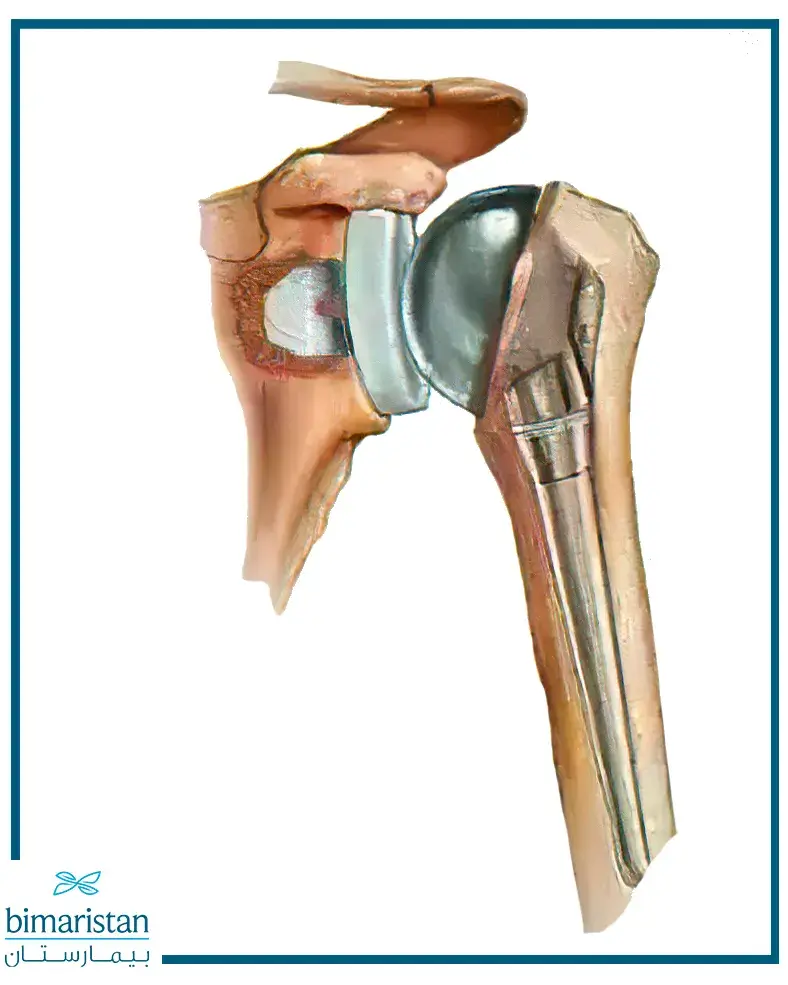
Why is the shoulder replacement procedure performed?
Shoulder arthroplasty is an option for patients with functional impairment in their joints. This is usually a result of osteoporosis, rotator cuff damage, vascular necrosis, rheumatoid arthritis, or (rarely) severe fractures due to trauma or falls.
Generally, all other treatment methods, such as physical therapy and medications, are considered first.
The doctor may recommend shoulder replacement surgery if the patient has the following symptoms:
- Severe pain in the shoulder joint to the point of struggling with simple daily activities like washing, getting dressed, or reaching into a cabinet.
- Loss of shoulder joint movement. Weakness in the shoulder muscles.
- Intense pain that prevents the patient from getting a good night’s sleep.
- Trying anti-inflammatory drugs, cortisone injections, and physical therapy without any relief; in some cases, your doctor may suggest stem cell therapy.
- Previous arthroscopic surgery or fracture repair that failed to alleviate symptoms.
There are several options in this matter; the doctor may only replace the damaged structures of the joint, or a complete joint replacement may be necessary.
How do you prepare for shoulder replacement surgery in Turkey? What happens before the surgery?
In Turkey, shoulder replacement surgery appointments are scheduled in advance unless there is an emergency. Once you know the surgery date, you will have enough time to prepare and plan for any special assistance you may need after leaving the hospital. Having a partner to assist you with home exercises after leaving the hospital is essential.
Your partner should accompany you to physical therapy at least once or twice during your stay in the hospital in Turkey. Shoulder replacement surgery can be performed as an outpatient procedure. Still, on average, you will stay one night in the hospital after the surgery to ensure pain control and medical stability before discharge.
A series of preoperative tests will be scheduled a week to two weeks before the shoulder replacement surgery. These usually include blood tests, an electrocardiogram (EKG) to assess the electrical activity of your heart, and a visit to the healthcare provider to ensure that you are medically eligible for surgery.
Some medications may be stopped as they can complicate the shoulder replacement surgery, while others may need to be continued. It would be best if you stopped using any anti-inflammatory medication, including aspirin, one week before the surgery unless instructed otherwise. You will be given instructions regarding your daily medications during this visit.
Shoulder replacement surgery will take approximately two to three hours and will be performed under general anesthesia.
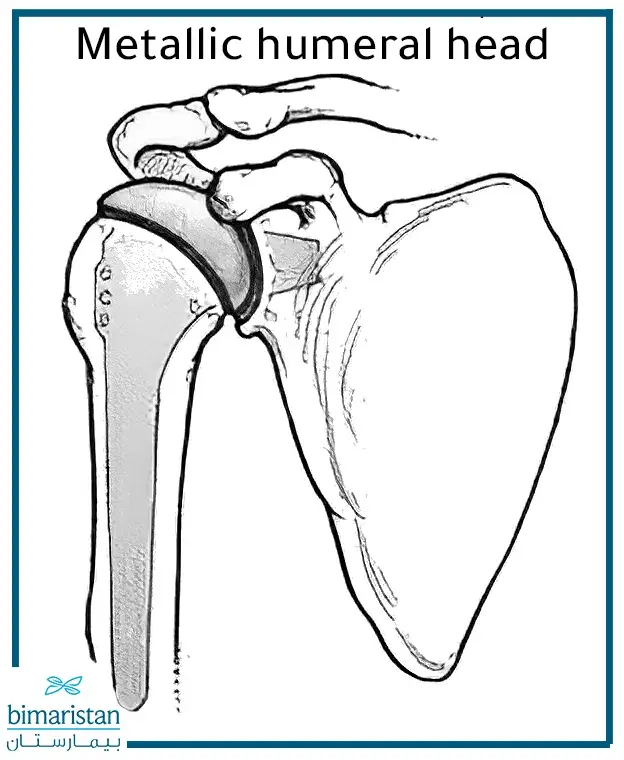
What should I expect after shoulder replacement surgery in Turkey?
Since the shoulder replacement procedure can be painful, pain control is significant. Your doctor will prescribe methods to control your pain fully.
During your hospital stay, you will be encouraged to get out of bed and move around. You should bring loose-fitting clothing with you as it will make dressing easier. You will be able to shower after 48 hours.
The physical therapist will help you learn specific exercises and how to continue them at home. Upon discharge from the hospital, you will also receive written instructions. These exercises are relatively simple and usually require only a short period of time.
The successful outcome of shoulder reconstruction largely depends on the precise performance of your exercises. Through this organized exercise program, your muscles will be stretched and strengthened systematically and gradually over the course of one year.
The desired result of the shoulder replacement surgery is the optimal function of the new artificial shoulder. Most patients do not require physical therapy, but in certain cases, regular physical therapy for outpatients after leaving the hospital may be necessary.
Bimaristan Medical Center in Turkey offers the best medical consultations for optimal medical care. They will guide you to the best joint replacement centers at the best prices and with skilled medical professionals to perform your shoulder replacement surgery. Don’t hesitate to contact us; Bimaristan Center is open to everyone.
Are there any complications of shoulder replacement surgery?
All surgical procedures involve some risks, and several potential complications may occur after shoulder prosthesis surgery, including:
- Infection: Mild infections in the surgical wound area can be treated with antibiotics, while severe infections may require additional surgery.
- Dislocation: In cases of reverse total shoulder replacement, dislocation of the joint may occur and sometimes requires treatment or surgery.
- Problems with the artificial joint: Artificial joints can wear out or occasionally dislocate. Sometimes, further surgery is needed.
- Nerve injury: Nerves can be damaged during surgery.
There is an increased risk of complications if you have diabetes. Diabetic patients may experience difficulty in wound healing and infections.
Instructions for going home after shoulder replacement surgery in Turkey
- Check the wound daily to see if there is increasing swelling or bleeding.
- Keep the dressing clean and secure, which will be removed after the wound has healed.
- When leaving the hospital, you will be given an appointment for a follow-up visit, usually 10 to 14 days later, to remove the dressing and receive a prescription for pain relief.
- Your healthcare provider will inform you about specific precautions and activity restrictions.
General instructions include:
- Follow your doctor’s instructions for driving, but upon discharge, you will need a driver to take you home.
- Avoid lifting anything heavier than a water glass for the first two to four weeks.
- Avoid lifting heavy objects for two months.
- Resume arm movements.
- Continue doing exercises at home as instructed by your physical therapist and other healthcare providers.
- Do not use your surgical arm to support your body weight when pushing yourself out of bed or a chair.
- Avoid repetitive heavy lifting and sports that involve physical contact.
- Avoid putting your arm in any “extreme position” during the first six weeks after surgery, such as not fully extending your arm to the side or behind your back.
Post-operation and recovery from shoulder replacement surgery
Your rehabilitation will be continuous and gradual, and it may take six months to a year to achieve optimal benefits. It is essential to understand that progress can sometimes be slow and inconsistent.
Your healthcare provider will monitor your progress during visits at intervals of six weeks for the first four to five months and then less frequently for one year.
Please note that any healthcare provider or dentist considering surgery for you in the future, including dental work, should give you antibiotics before and after the surgery to prevent infection. This includes all surgical procedures, endoscopic procedures, and tooth extractions.
Any infection, such as a urinary tract infection, should be promptly treated with antibiotics, as bacteria can spread to the replaced joint. When receiving any medical treatment, inform the responsible person that you have undergone a total shoulder replacement surgery.
Returning to work depends on your treatment progress and your job’s requirements. People without physically demanding jobs can return to work after two months. However, if your job involves heavy lifting or repetitive physical activity, you may need to change your work environment.
If you have a physically demanding job, you should increase your therapeutic exercises to the maximum extent, including strength training, and discuss the best time to return to work with your surgeon. People who have undergone shoulder replacement surgery can participate in sports such as golf, swimming, and tennis.
In some cases, your doctor may recommend visiting the latest rehabilitation and physical therapy centers in Turkey with the assistance of robots.
How long does it take to recover from shoulder replacement surgery?
The recovery period varies from person to person and also depends on the type of shoulder reconstruction surgery you have undergone. Typically, using your arm for activities at waist level on the first day following surgery would be best. You should dress yourself and feed yourself within the first week. Be cautious when driving. Only resume driving when you are confident that you can do so safely.
The ultimate goal of shoulder replacement surgery is to alleviate pain and improve range of motion and function. Treatment in Turkey is considered a destination for many due to its excellent medical services at affordable prices. Turkish hospitals also fulfill their commitment to providing the best possible medical care.
Today, joint replacement surgeries are commonly performed in Turkey, and outstanding results are achieved, particularly with knee and shoulder replacement surgeries. Although shoulder replacement is less common than hip or knee replacement, it holds significant importance for patients with shoulder conditions that are resistant to other treatments.
What physical activity suits those with shoulder joint disorders, walking or swimming?
Physical activity and shoulder joint disorders:
Physical activity can be an important part of managing shoulder joint disorders. It can help improve range of motion and strength and reduce pain. However, it is important to choose appropriate activities and avoid those that may worsen pain or injury.
Some activities that may be suitable for people with shoulder joint disorders include:
- Swimming: Swimming is a low-impact activity that can help improve range of motion and strength without putting stress on the joint.
- Walking: Walking is also a low-impact activity that can help improve overall fitness and strengthen the muscles around the shoulder.
- Yoga and Pilates exercises: These exercises can help improve flexibility, range of motion, and strength.
- Shoulder strengthening exercises: Strengthening exercises can help build the muscles around the joint, which may improve stability and support.
Additional tips for people with shoulder joint disorders:
- Start slowly and gradually increase the duration and intensity of exercises.
- Listen to your body and rest if you feel pain.
- Use ice or heat packs to help reduce pain and inflammation.
- Wearing a shoulder brace may help provide support and stability.
Cost of shoulder replacement surgery
The cost of shoulder replacement surgery in Turkey varies based on several factors, including the hospital or medical center where the surgery is performed, the surgeon’s expertise, the type of prosthetic joint used, and the medical care required before and after the surgery. Generally, the cost of this surgery can range from $7,000 to $15,000 USD.
These prices usually include the surgery itself, hospital stay, and necessary medical care. It is always recommended to contact the chosen hospital or medical center to get an accurate cost estimate based on the patient’s individual needs.
References:
